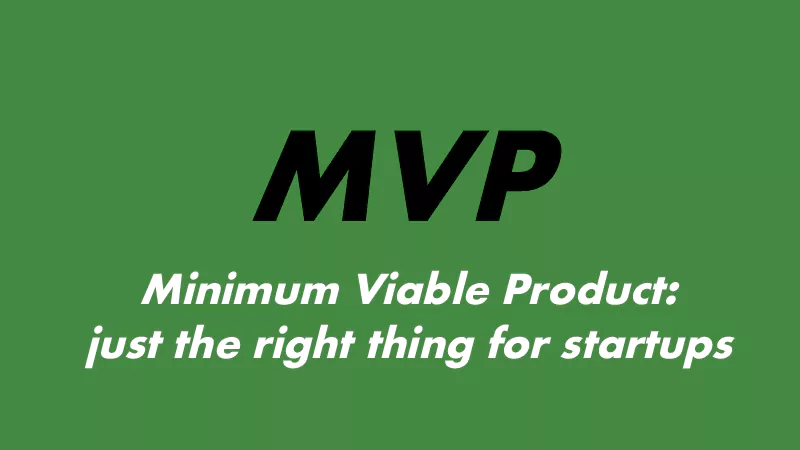Why is Minimum Viable Product needed for startups? What are the benefits? What can be done with its help? Learn here!
Table of Contents
MVP: a MUST for every startup
With a Minimum Viable Product (MVP), not only the product but also price policy, marketing, and sales concepts and even the entire business model can be tried out and optimized with little money and resources. The MVP model is a great choice for the establishment of a startup. Actually, MVP development for startups is a must nowadays. Let’s learn more about it.
The basic idea of a lean startup
Silicon Valley luminary Eric Ries has designed Lean startup management for financially weak companies. According to this, a startup should first develop and launch an innovative product with low costs and resources in order to continuously develop it based on customer feedback.
“The MVP is about creating a first product and collecting money for it,” explains Harald Wagner, a financial coach at BayStartUP in Munich and lecturer at Landshut University of Applied Sciences. The lean startup method aims to remain lean, further develop the product in short development sprints, and test it repeatedly on the customer.
Customer feedback is taken into account in every development step. “The goal is to involve the customer as a co-creator,” explains Wagner.
The advantages of the MVP model for startups
In this way, not only the development costs are reduced, but also initial income is generated. Since startups are financed in the early phase, especially through the money of the founders (“bootstrapping”) or through investors from the personal environment, early income is a welcome relief. No wonder the MVP model is particularly popular with digitally oriented startups.
The advantages of an MVP at a glance
- Testing the customer benefit: only when you go on the market with a product or service can you learn whether the customers accept this and pay for it.
- Early feedback from customers: with an MVP, feedback can be obtained quickly from customers. This enables the gradual further development of the MVP along with the customer benefit.
- Reduction of costs and risks: developing the perfect product is associated with high costs, which is a problem for financially weak startups.
- First income: with an MVP, first income is generated, which is particularly welcome with financially weak startups.
- Investors are easier to find: with the successful launch of an MVP, you show potential investors the sustainability of your business idea, which is a big plus when finding investors and negotiating the participation agreement.
- Early occupation of a market niche: startups like to talk about the uniqueness of the product. But often, that’s not true. Nevertheless, anyone who occupies the market niche with an MVP in such a situation gains a veritable starting advantage.
How lean a startup can be
It is amazing how lean an MVP can be. Wagner reports on a fitness startup that first built up groups on social media where people met in the park for fitness training without equipment. The MVP only consisted of a paid PDF of the exercises, available for download. Only then did an app be developed. “This is super-lean,” comments Wagner. “In this way, you can test whether there is even a market for your idea.”
However, how lean an MVP is can also depend on the competition. “The more competitive a market segment is, the more detailed an MVP must be, or at least it needs to present the feature with which it clearly distinguishes itself from the competition,” Wagner adds.
MVP helps to develop the business model
According to Wagner, MVP can also help to evaluate and further develop the business plan. Given that startup business models often look significantly different several years later, this is a nice advantage.
Test marketing and sales with MVP
Although the MVP is initially about product development, the concept allows important conclusions to be drawn about a startup’s marketing concepts and sales channels. For example, the customer acquisition costs can be determined with an MVP. Wagner knows a case in which, for example, customer acquisition via Instagram campaigns was worthwhile, while Google ads were simply too expensive.
MVP indicates the funding maturity of a startup
Marketability of the product, business model, marketing, and sales channels – no question, many aspects of a startup can be tested with an MVP. It is really important because startups usually need a lot of capital after the starting phase to enter the growth phase and therefore depend on investors. For Wagner, the successful testing of the MVP on the customer market thus speaks for the financing maturity of a startup. “This is crucial for many potential investors,” Wagner underlines.
The limits of the MVP
Although the MVP seems tailor-made for many startup business models, there are limits. “One area is medical startups where certifications are required, and it is simply about human lives,” warns Wagner. “Another area is data security. You just can’t get there with a sloppy product.”
But there is scope for the philosophy of the MVP. “For example, a data security startup can go on the market, in which the security-critical software architecture is 100 percent, but far from the complete range of functions in the frontend for the user,” adds Wagner.
Conclusion
An MVP not only accelerates the development of a product to market maturity but also tests and further develops marketing and sales as well as the entire business model. This makes it a milestone in setting up a startup and testifies to its funding maturity. Consequently, the concept is particularly suitable for low-capital and resource startups. Guys from SECL know how to create MVPs to meet all of your needs!
Also Read: Qualities of a Great Website

